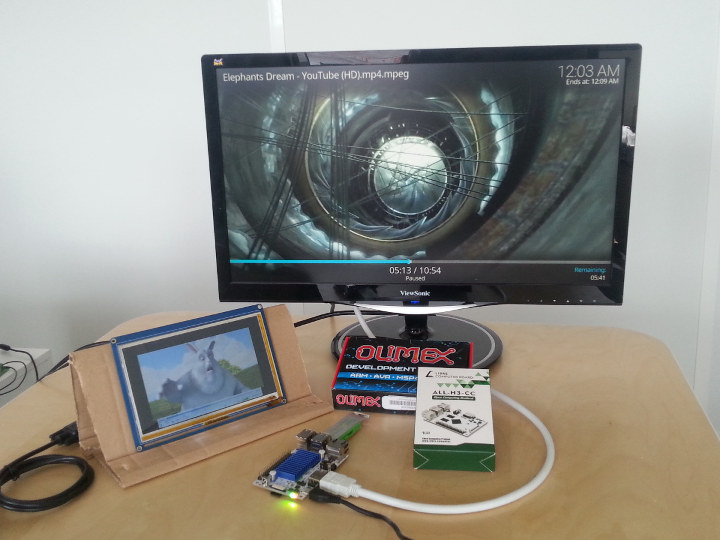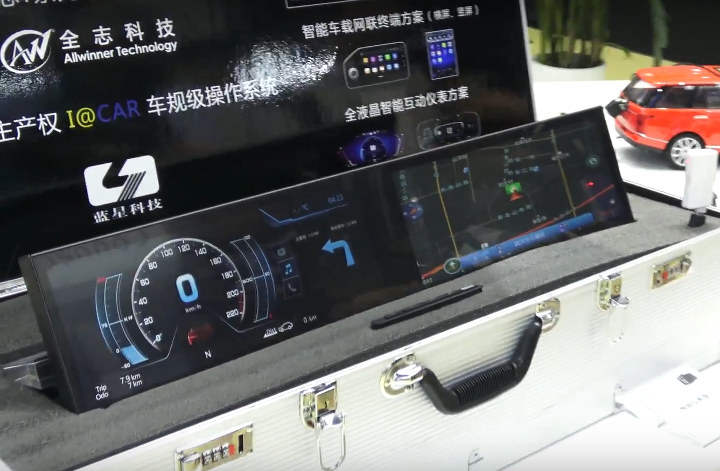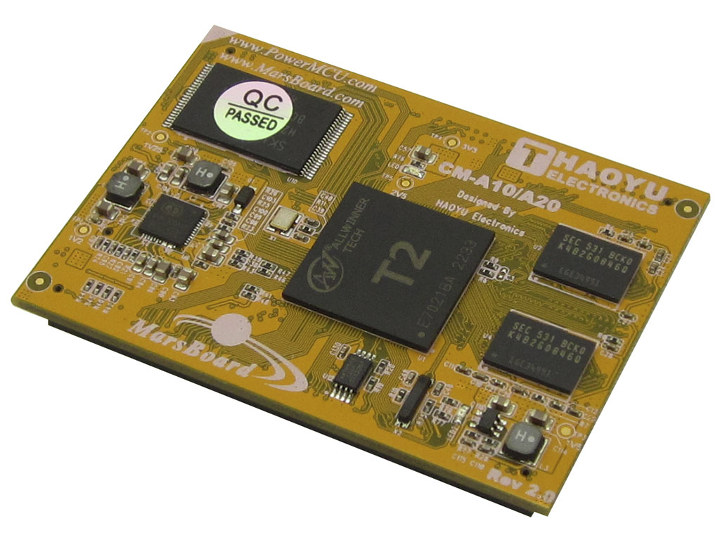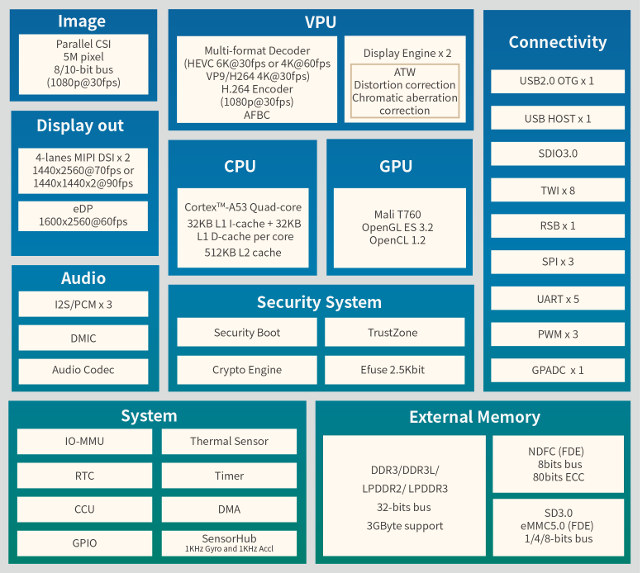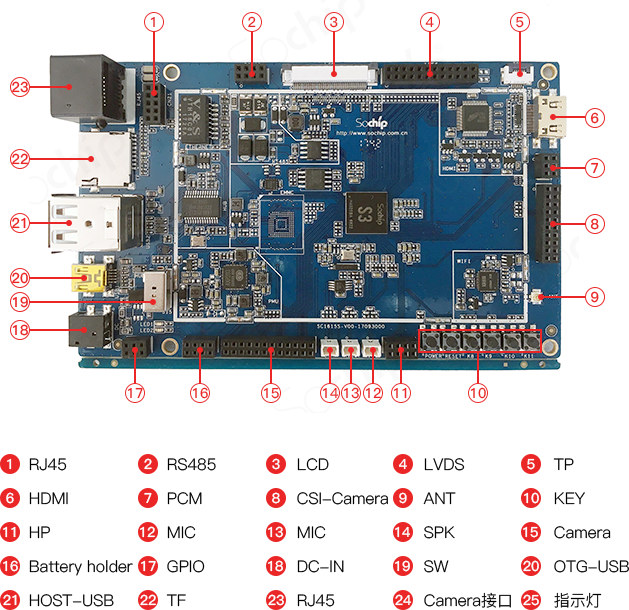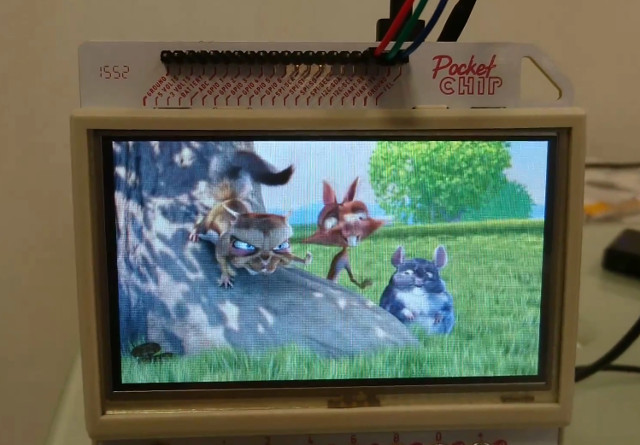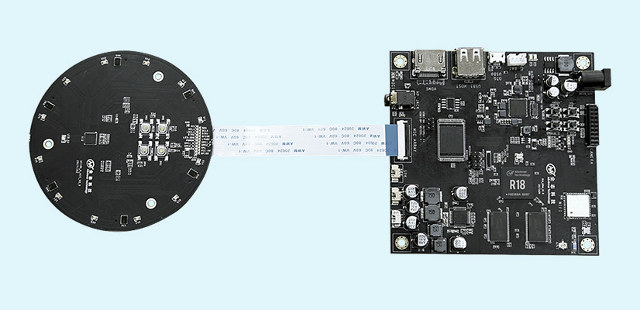At the beginning of the year, Bootlin – formerly Free Electrons – launched a crowdfunding campaign to bring open source Allwinner VPU driver to mainline Linux. VPU (Video Processing Unit) drivers are used to encode and decode videos. They were successfully in raising enough money from small donors, as well as several companies manufacturing Allwinner development boards including Olimex, Pine64, Libre Computer, FriendlyELEC, and Xunlong Software (Orange Pi). The amount raised (€31,612) was enough to assign two engineers to work on the main goals, as well as some stretch goals namely support for newer Allwinner H3, H5, and A64 processors, and H.265 video decoding. The good news is the company has now delivery the first release for their work on the main goals. The photo above illustrated a demo of Kodi running with bootlin open source Cedrus VPU driver on top of Linux 4.18-rc kernel. Both MPEG2 and H264 are […]
Allwinner T7 Automotive SoC Complies with AEC-Q100 Grade 3 Specifications
Allwinner T-series processors such as Allwinner T2 are designed for the transportation / automotive market for products like smart rear-view mirrors, infotainment systems, and navigation systems. While the company’s offered wide-temperature range support, AFAIK they did not have a part that had an actual automotive certification so far. This changes with their Allwinner T7 processor which is said to be the first Chinese processor achieving AEC-Q100 Grade 3 qualification. AEC-Q100 is a “failure mechanism based stress test qualification for integrated circuits” brought out by the Automotive Electronics Council. The chip must pass various tests within their specified temperature range (grade): Grade 0: -40°C to +150°C ambient operating temperature range Grade 1: -40°C to +125°C ambient operating temperature range Grade 2: -40°C to +105°C ambient operating temperature range Grade 3: -40°C to +85°C ambient operating temperature range Grade 4: 0°C to +70°C ambient operating temperature range Allwinner T7 comes with an […]
Allwinner T2 is a Rebranded Allwinner A20 Processor Operating in Industrial Temperature Range
Last month, Allwinner unveiled A40 and A60 industrial and military grade processors leveraging IP blocks from the old-but-popular Allwinner A20 dual core processor. This is good news for software support, as A40 and A60 should hopefully become supported in U-boot and the Linux kernel without too many efforts, as well as for companies or makers requiring wider temperature ranges in their products. However, those new processors were not pin-to-pin compatible with Allwinner A20, so a PCB redesign would be required. That’s where Allwinner T2 comes into play, as reported by Olimex, it is a rebranded Allwinner A20 dual core Cortex A7 processor with an industrial temperature range (-40 to +85 °C) that makes it suitable for automotive infotainment. I actually covered Allwinner T2 back in 2015, but at the time Allwinner did not mention anything about temperature range, and SATA support – found in A20 – was not shows in […]
Allwinner Unveils A40i/A40pro and A60i/A60pro Industrial & Military Grade Processors
Allwinner A20 dual core Cortex A7 processor was/is one of the most popular Allwinner SoCs thanks to its low cost, the availability of interfaces such as SATA, Gigabit Ethernet, HDMI 1.4, and multimedia support with H.264 encoding and decoding. The company has now introduced new processors that build upon A20, but working in industrial and military temperature ranges, and compliant with various standards (TBD). Allwinner A40i & A40pro The first two models are quad core Cortex A7 processors with A40i being the industrial version, and A40pro the military grade one. Both share most of the same specifications: CPU – 4x Arm Cortex A7 @ 1.2 GHz GPU – Mali-400 MP2 Memory I/F – DDR2/DDR3/LPDDR2/LPDDR3 up to 3GB RAM Storage I/F – 32-bit NAND, eMMC, SD card, SPI NOR flash, SPI NAND flash, 1x SATA Video Engine Decoder – Multi-format decoder up to 1080p60 Encoder – H.264 encoder up to 1080p45 […]
Allwinner VR9 SoC is Specifically Designed for Extended/Virtual Reality Headsets
Virtual reality headsets have been powered by application processors designed for smartphones, tablets, or even TV boxes. For example last year, I reviewed a low cost VR headset good enough to watch 360 / VR videos, but not gaming that was based on Allwinner H8 TV box processor. But we’ve previously seen Allwinner was working on VR9 & VR10 processors specifically designed for virtual reality headsets with launches scheduled for Q4 2016 and Q2 2017. There’s obviously been some delays, but the company also now formally launched Allwinner VR9 quad core Cortex A53 processor specifically designed for XR and VR headset (Extended / Virtual reality). Allwinner VR9 key features & specifications with parts that look specific to XR/VR highlighted in bold: CPU – Quad-Core Arm CortexM-A53 @ 1.8GHz with 32KB L1 I-cache + 32KB L1 D-cache per core, 512KB L2 cache, CoolFlex power management architecture GPU – Arm Mali-T760 @ […]
Allwinner S3 Dual Camera SoC Includes 128MB RAM, an I2S Audio Interface
Allwinner V3s processor was introduced a little over a year ago with a single Arm Cortex A7 core, 64MB DRAM built-in, and designed for camera applications with parallel CSI and 4-lane MIPI CSI2 interfaces It looks like Allwinner has now launched an updated version with Allwinner S3, still based on Cortex A7, but increasing memory to 128MB, and adding some interfaces like I2S. We don’t have a whole lot of information, apart from a development board (SC1615S) on Taobao with the following (tentative) specifications: SoC – Allwinner / Sochip S3 Cortex-A7 processor with 128MB DDR3 Storage – 16MB NOR Flash, 4GB eMMC flash, SPI NAND flash, micro SD card Display I/F – LCD, LVDS, touch panel connectors, HDMI port Camera I/F – 1x 4-lane MIPI CSI, 1x parallel CSI Audio – HP, 2x MIC, speaker headers, PCM header Connectivity – 10/100M Ethernet, 802.11 b/g/n WiFi + Bluetooth (AP6212 or XR819 […]
Bootlin Wants to Bring Allwinner VPU Support to Mainline Linux (Crowdfunding)
I wrote about Free Electrons several times in the past due to their work on porting Arm SoCs to mainline Linux. Free Electrons is no more. But don’t be sad, as it’s not because they closed shop, but instead they changed their name to Bootlin due to trademark trolls. Free Electrons Bootlin intensively worked on Allwinner processors, for example working with Next Things Co. to add CHIP board to mainline Linux, or more recently adding support for OpenGL ES in mainline Linux, albeit with closed-source user space binary blobs. The company normally work with partners for their work, but for their latest initiative aiming to bring Allwinner VPU (Video Processing Unit) to the official Linux kernel there’s asking funding from the community through a Kickstarter campaign. For those who do not know, the VPU is the IP block within the SoC used for hardware video decoding of codecs such as MPEG2, […]
$129 Allwinner R18 based 3-Mic Far Field Amazon AVS Development Kit in the Works
Several companies are already offering development kits for Amazon AVS (Alexa Voice Service), but as we’ve seen in the past, those are rather expensive with far-field kits such starting at $349 with kits such as Synaptics AudioSmart 4-Mic Development Kit, or Intel Speech Enabling Developer Kit, and hands-free kits being barely cheaper at $299 and up. But there will soon be a cheaper solution, as Allwinner and SinoVoIP (aka Banana Pi) are working on “SoC-Only 3-Mic Far-Field Dev Kit for Amazon AVS” that includes 3 microphones, and works without special DSP, relying instead on Allwinner R18 processor’s audio codec and capabilities. Allwinner SoC-Only 3-Mic Far-Field Dev Kit for Amazon AVS (aka R18-AVS-EVK) specifications: SoC – Allwinner R18 quad-core Cortex-A53 processor @ 1.15GHz with Mali400MP2 GPU System Memory – 1GB DDR3 Storage – 8GB eMMC flash Video Output – HDMI Audio – 6x Microphones, 2x AEC, AUX and headphone output; GMEMS voice […]


